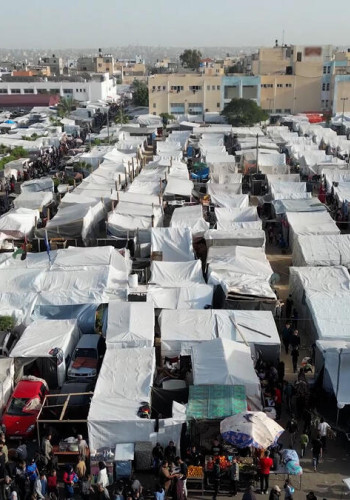Deaths by starvation and disease may top deaths by bombs as families squeezed into deadly "safe zones", two months into Gaza crisis
Two months of relentless bombardment, an Israeli-imposed siege, and dangerous relocation orders have stripped families’ options for survival in Gaza, warned Save the Children today.

Aerial shots of camp sheltering people who are displaced in Khan Younis.
Whilst the UN Security Council has failed yet again to secure a definitive ceasefire and provide respite for civilians in Gaza, Save the Children has continued to hear harrowing accounts of families going multiple days without food, shelter, water and access to healthcare, including in the so called ‘safe zone’ of Al-Mawasi.
Deliberately depriving the civilian population of food, water and fuel and wilfully impeding relief supplies is using starvation as a method of warfare, which inevitably has a deadly impact on children. Consecutive relocation orders issued by the Government of Israel forcing civilians into deadly "safe zones" have only endangered civilians further as they are pushed into areas that cannot accommodate them or provide the necessary access to basic services - and that continue to be attacked, said the aid agency.
"The repeated failure of the international community to act signifies a death knell to children. Israel is squeezing Palestinian children and families into ‘death zones’ dubbed as ‘safe zones.’ I’ve seen children and families roaming the streets of what hasn’t been flattened in Gaza, with no food, nowhere to go, and nothing to survive on. Even the internationally-funded humanitarian aid response - Gaza’s last lifeline - has been choked by Israeli-imposed restrictions.
"Gaza’s children are being condemned to further bombardment, starvation, and disease. We must heed the lessons from the past and must immediately prevent ‘atrocity crimes’ from unfolding, " said Jason Lee, Save the Children’s Country Director, currently in Gaza.
The UN has repeatedly warned that Gaza’s food system collapse means there is a high risk of famine. In early December 2023, data from the Nutrition Cluster in Gaza showed that at least 7,685 children under five were suffering from severe wasting, the deadliest form of child malnutrition requiring urgent medical treatment to avoid death. 1
A new food security assessment from WFP found that nine out of ten people in Gaza reported spending at least twenty four hours without food, and almost a fifth experienced it for more than ten days in the past month. Basic food items are being sold at unprecedented, inflated prices due to scarcity in the markets. No bakery has not been operational in northern Gaza in more than a month.
Save the Children staff members have reported a bag of flour being sold for up to 500 ILS (equivalent of $140 USD). Others, including one responsible for a household of 20 people, could not find any flour at all. Staff described the situation in the so-called safe zone of Al-Mawasi as desperate, with one staff member said, "I know people who have not eaten food for 3 days."
The Israeli forces are pushing civilians to move towards Rafah along the Egyptian border where the situation is equally dire. Another staff member said, "Life in Rafah has become more difficult than death. Thousands of people are in the streets with their children, and people with disabilities are sleeping in the open without any assistance."
The WHO have also warned that the near-total collapse of the healthcare, water and sanitation system means more people could die from disease than from bombings in Gaza. Facilities are being decimated by fighting, crippled by fuel and supple shortages, and exhausted by the mounting pressure on those that are still functioning. Access to clean water has been denied for weeks, with people consuming 59-89% less water than prior to the current escalation. Families are left with little option but to drink from unsafe water sources in a bid to survive, which risk the spread of waterborne diseases such as cholera.
The sanitary conditions in camps and shelters, where more than a million people have sought refuge are dire with hundreds of people sharing a single toilet. Most sanitation services are inoperable, resulting in a pile-up of approximately 400,000 kilograms of waste per day in camps and shelters - equivalent to the weight of 9,000 toilets. This is a grave concern for the health of children and families, with diseases such as Hepatitis A, likely only to worsen as more people are forced into even smaller so called "safe" areas.
Save the Children is calling on the international community to secure an immediate and definitive ceasefire and for the Government of Israel to reverse the conditions that have made a meaningful humanitarian response almost impossible, including unfettered humanitarian access to all of Gaza, and the restoration of the commercial sector entry into Gaza. Starvation must never be used as a method of warfare.

